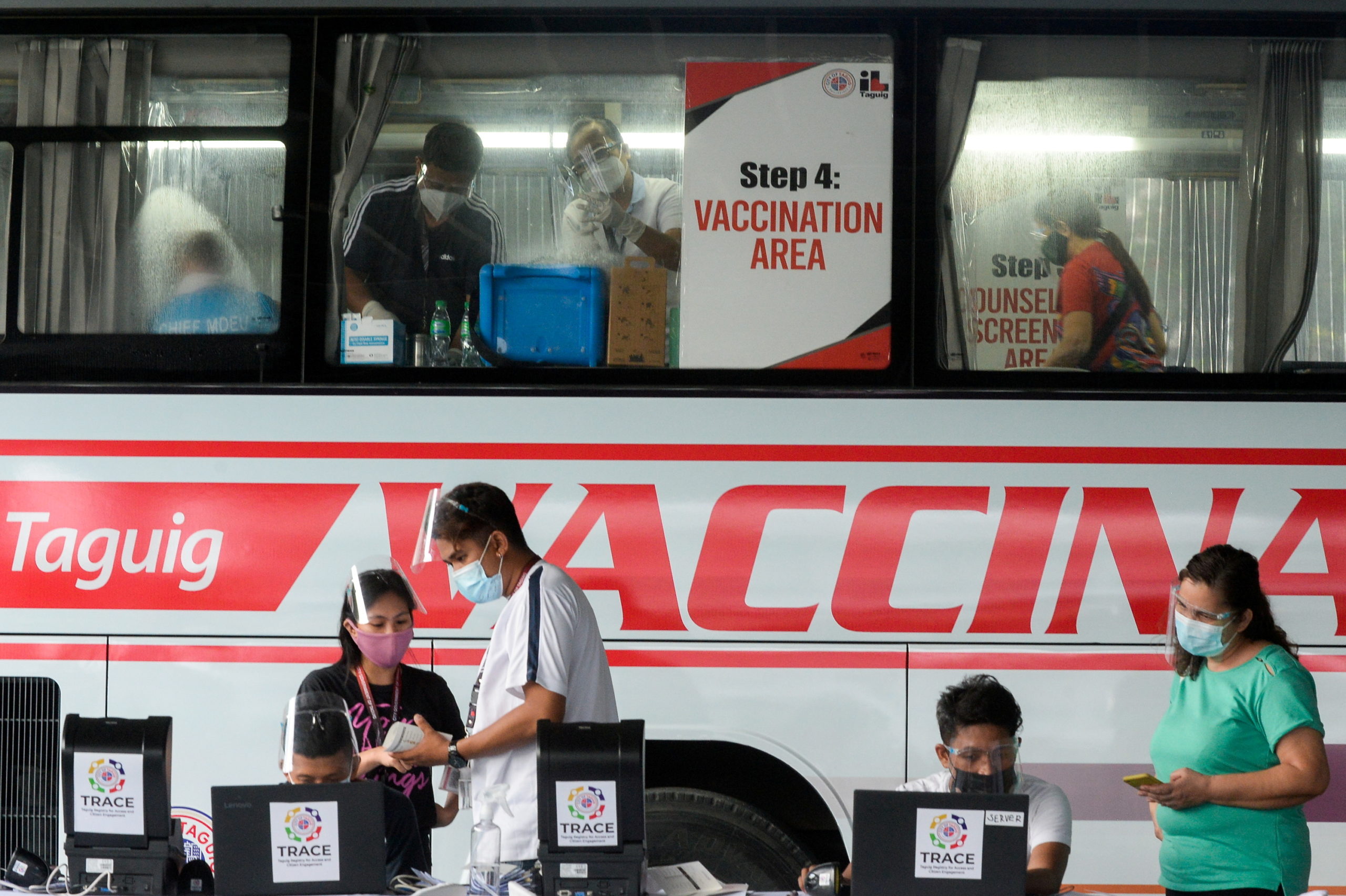
FILE PHOTO: Health workers encode information and prepare vaccines against the coronavirus disease (COVID-19) at a mobile vaccination site in Taguig, Metro Manila, Philippines, May 21, 2021. REUTERS/Lisa Marie David/File Photo
MANILA, Philippines — A lawmaker is again questioning why local government units (LGUs) are barred from procuring their own COVID-19 vaccines when an existing law allows them to do so through multi-party agreements (MPAs).
At the Kapihan sa Manila Bay Forum on Wednesday, AAMBIS-Owa party-list Rep. Sharon Garin said that she has already filed a resolution asking the national government to explain why portions of Republic Act No. 11525 — which established the COVID-19 vaccine procurement procedures — are not being implemented.
Garin was referring to Section 3 of the said law which allowed LGUs and other procurement entities to enter into contracts or MPAs between the purchasing party, the vaccine manufacturer or authorized local distributor, and the national government.
“Actually the law has already been passed, allows the multi-party agreement where the private, or the LGU can purchase na rin. Kaya siya multi-party kasi (It’s multi-party because) the national government will be involved, like it will also sign in the agreement,” Garin said during the forum.
“The thing is, although it’s under R.A. 11525, there are many pending applications for this, or many agreements that are pending for signature of the national government, mga ano ‘yan eh, I think about 10 million doses yata ‘yan ang pending d’yan. It hasn’t been signed,” she added.
According to Garin, vaccine czar Secretary Carlito Galvez Jr. gave various reasons as to why such provisions in the law and why the procurement have pushed through, like pharmaceutical companies no longer accepting orders, the lack of an emergency use authorization at that time, and other companies prioritizing the national government instead.
But such reasons, Garin said, are not sufficient — hence the need for an inquiry on the matter. She added that if the national government wants to avoid competing with LGUs for the supply of vaccines, safeguards may be placed to ensure that procurements will not affect the national vaccination program.
“Matagal na naman tong kine-question eh, kasi for example, why not give — the concept of our republic is autonomy of all these local governments. Should the LGU decide and allot their own money, and why not? And it’s not about competing with the national government, this is not a competition,” she stated.
“If we have resources from the local government in which national government doesn’t have access, why not? […] We can place safeguards that it should not hinder the vaccination program undertaken by the national government kung ayaw natin ng competition in the purchasing then fine, we can put conditions on that. But let’s not be so black and white na ‘wag muna dahil tatapusin muna namin ‘yong aming (vaccination program),” she added.
To recall, at the start of 2021, local government units were hailed for initiating contracts with COVID-19 vaccine suppliers, at a time when the national government was being criticized for its handling of the country’s vaccine procurement program.
READ: National gov’t lags behind LGUs, firms in making vaccine deals – senators
READ: Unlike gov’t, LGUs and private firms already have ‘perfected’ Covid-19 jabs deals
But until now, all of the country’s vaccine doses have come through contracts made by — and donations are given to — the national government.
Galvez was not in the forum to explain his side, but Presidential Adviser for Entrepreneurship and Go Negosyo Founder Joey Concepcion, a fixture in Inter-Agency Task Force for the Management of Emerging Infectious Diseases (IATF) meetings, defended him by explaining that the issue is beyond Galvez’ hands.
One example, Concepcion said, is that certain vaccine manufacturers have prioritized their point of origin when COVID-19 surges occurred within their countries.
“The challenge really that I see is of course the countries that own the vaccines like America, like India, they have the biggest vaccine manufacturing plant in the world. When it comes in the problem in their country, they will hold back and give it to their citizens, so it’s a normal reaction,” Concepcion, who was also in the forum, said.
“So when we ordered the AstraZeneca at that time, and 69 LGUs participate, actually the orders of the LGUs in the AstraZeneca is much larger than the private sector, it’s 11.5 (million) versus 5.5 (million). The only reason why we came first is because the big companies put in our money in,” he added.
Concepcion also stressed that the Philippines is actually in a unique position because LGUs and the private sector are allowed to procure their own vaccines.
“All over the world it’s really the national government that really buys the vaccines, the Philippines is an exception that we are allowed to buy vaccines and now the LGUs are allowed, so that is a unique thing,” he noted.
“In fairness to Secretary Galvez he did something really different and congressmen also supported it by enacting the law. But now we constantly face these challenges like for Novavax, we had orders for Novavax for the private sector and Covaxin […] then we have this India problem. Finally, now their cases are going down, and so in October, they will allow the exports of Novavax and Covaxin,” he added.